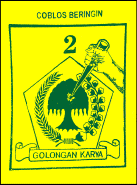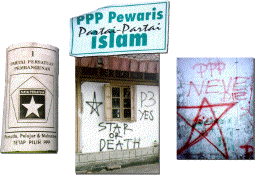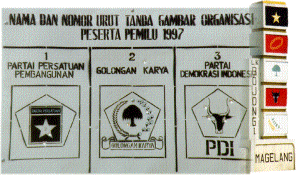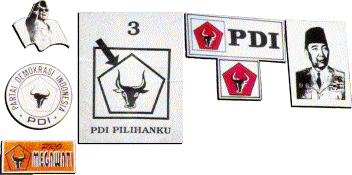
When I asked the ethnic Chinese shop owner in Yogyakarta about corruption he said that it proliferated in Jakarta. When I asked about corruption in Yogyakarta, he responded with "you have to try and start somewhere."
There is a tendency to categorize a polity by a country's historical setting as if all countries are moving towards one reference point. Americans use the political model of the United States, in its most ideal sense as that reference point. While I believe this is fallacious, it is a tendency I am in danger of adopting though not consciously and I make this remark to warn the reader to be more critical of what I have to say. The paramount leader of Indonesia for a quarter century was Suharto. Indonesia has only had two leaders in its brief existence as a newly independent country and Suharto's predecessor was Sukarno.
To grossly simplify Indonesia's recent political history, Sukarno can be identified as a charismatic nationalist who, as other nationalists of the period did, often used Marxism-Leninism as a vehicle for his nationalism. His charisma provided a focal point for nationalism for a nation that was becoming increasingly educated about the injustices of Dutch colonialism. As a leader of a sovereign nation, he was ineffective and his policies, based in large part on alliances with communist countries, was disastrous. His rule came to a close in violence that rocked Indonesia in the mid-1960s, the source of which is still debated. Chinese-Indonesians were the focus of the violence, but it might be more accurate to say that Sukarno's policies created a national crisis which eventually was vented in the direction of historical ethnic tensions and the slaughter of hundreds of thousands, perhaps more, Indonesians, mostly ethnic Chinese.
At the time of our visit, much of the debate of these events centered around how much Indonesia's leader, Suharto, orchestrated events or merely exploited opportunities which lead to his eventual accession to power. Under Suharto, Indonesia had begun to economically develop,  but the wealth of the nation was overwhelmingly tied to ethnic Chinese and nepotism radiating from Suharto himself. This development had occurred under tight political control. Suharto was often referred to as the Dalang, or puppet master, of events in Indonesia. His power was gauged by how he exerted it; if he quietly maneuvered or seemingly not at all, he was most potent. As a result, detentions and imprisonment of dissenters were not made at his behest, but by the "state" under such laws as the one stipulating a six year jail term for insulting the president or his deputy. The "state" was comprised of those who had curried favor with a national machine, Golkar (Golongan Karya, or Functional Groups), for anything affected by government policy including permits to operate businesses. Suharto also controled the military through appointments though it is often quizzically remarked that he rules in concert with the military. Because of this design, Suharto, who turned 75 years old in 1997, ruled as strongly as any dictator and his actions had only been slightly more benign (many have died because of his policies, but sheer numbers pale in comparison to other dictators in the 20th Century).
but the wealth of the nation was overwhelmingly tied to ethnic Chinese and nepotism radiating from Suharto himself. This development had occurred under tight political control. Suharto was often referred to as the Dalang, or puppet master, of events in Indonesia. His power was gauged by how he exerted it; if he quietly maneuvered or seemingly not at all, he was most potent. As a result, detentions and imprisonment of dissenters were not made at his behest, but by the "state" under such laws as the one stipulating a six year jail term for insulting the president or his deputy. The "state" was comprised of those who had curried favor with a national machine, Golkar (Golongan Karya, or Functional Groups), for anything affected by government policy including permits to operate businesses. Suharto also controled the military through appointments though it is often quizzically remarked that he rules in concert with the military. Because of this design, Suharto, who turned 75 years old in 1997, ruled as strongly as any dictator and his actions had only been slightly more benign (many have died because of his policies, but sheer numbers pale in comparison to other dictators in the 20th Century).
I had the privilege of speaking with a man who was born and raised in a foreign country. He has traveled throughout the world while working for the United Nations and has for the last several years lived with his wife and child in Indonesia. His wife is Indonesian, but has lived for a few years in Los Angeles. They are both Muslim and have a small boy whose age perhaps corresponds to the years his "foreign" father has spent in Indonesia.
This man, whose name we never had the opportunity to know, was a traveler at heart who seemed a little bit at odds with his length of stay in Indonesia. He didn't directly fault the people. He said Indonesians treated him as if he was Indonesian in large part because the color of his skin is similar to their own. Life didn't appear to be that difficult for him either. He was a consultant and had a small business he ran with his wife. His discontent, though, seemed to go beyond that of a traveler's heart restrained.
As I've mentioned, his wife is Indonesian and he said that he had Indonesian friends, but he still seemed to have contempt for Indonesians in general. He commented that they always have silly smiles on their faces and are lazy. An old woman who, seeing me from outside this man's business, mumbled something in Indonesian, came inside, walked over to me and grabbed my arm to feel it. Then she went over to my wife and did the same thing, but for a longer time. Puzzled, Karen asked our friend what this woman was up to. He replied that he didn't know, but that she would probably ask for RP1000 after a few minutes.
In the course of our conversation, he also commented on becak drivers, who he believed spent more time lounging on their becaks than plying a trade.
This is not to say that Indonesians may not be "lazy" compared to other nationals, that the old woman would not have asked for RP1000 - she probably would have. I offer this brief story of a man's opinions with all the known biases, as one perspective of Indonesia and to reveal some acquired biases that may have affected his comments about Indonesian politics which follow. His comments are of value precisely because he is a foreigner who, by virtue of the fact that his wife and child are Indonesian, is not a casual observer.
 Our friend, who lives on Java, lamented the fact that the Italian-born wife of the late Rajiv Gandhi had a credible chance of being Prime Minister of India while it is impossible for him to become an Indonesian, even if he lives in Indonesia for twenty years and has an Indonesian son. He was also critical of Indonesia's lack of political freedom. He didn't criticize the absurdity of the system, his complaint was more basic. He was angered by the lack of free speech. He said that despite the fact that restrictions were placed on campaigning for PPP (Partai Persatuan Pembangunan, or United Development Party) which weren't placed on Golkar, you could only see green (the color of the PPP) in his town before the election. Despite this, the election results were miraculously and overwhelmingly in favor of Golkar, the longstanding, ruling party. He was also annoyed by the censorship imposed on the newspapers.
Our friend, who lives on Java, lamented the fact that the Italian-born wife of the late Rajiv Gandhi had a credible chance of being Prime Minister of India while it is impossible for him to become an Indonesian, even if he lives in Indonesia for twenty years and has an Indonesian son. He was also critical of Indonesia's lack of political freedom. He didn't criticize the absurdity of the system, his complaint was more basic. He was angered by the lack of free speech. He said that despite the fact that restrictions were placed on campaigning for PPP (Partai Persatuan Pembangunan, or United Development Party) which weren't placed on Golkar, you could only see green (the color of the PPP) in his town before the election. Despite this, the election results were miraculously and overwhelmingly in favor of Golkar, the longstanding, ruling party. He was also annoyed by the censorship imposed on the newspapers.
 The column to the left refers to five political parties, two of which had been banned at the time of the 1997 elections. A third party, PDI (Partai Demokrasi Indonesi), had been commandeered by the government who replaced the party's leader, Megawati Sukarnoputri, daughter of former Indonesian leader Sukarno, with a former Golkar leader. Leaders of one of the banned opposition parties were jailed the same year for taking part in demonstrations which followed the forceful takeover of Sukarnoputri's party office by her government/military sponsored replacement.
The column to the left refers to five political parties, two of which had been banned at the time of the 1997 elections. A third party, PDI (Partai Demokrasi Indonesi), had been commandeered by the government who replaced the party's leader, Megawati Sukarnoputri, daughter of former Indonesian leader Sukarno, with a former Golkar leader. Leaders of one of the banned opposition parties were jailed the same year for taking part in demonstrations which followed the forceful takeover of Sukarnoputri's party office by her government/military sponsored replacement.
As we walked in the direction of a historical site in Yogyakarta, we came across some columns at the entrance to one small street where some boys were playing soccer. I noticed that the columns had painted on them the symbols for the five parties, including the three parties that were involved in the "election" that had ended the week before. I was amazed at how aware the boys were when I asked them about the parties. One boy even picked up an old Indonesian newspaper page from the ground and showed me a photo with a caption that said something about Mega Bintang ("Mega Bintang" grew out of popular support for an unofficial alliance between Megawati Sukarnoputri, after she was ousted as the leader of the PDI, and the PPP whose symbol is a bintang, or star). They told me what the other party symbols represented parties that no longer existed. When I asked them about the karabau picture (a silhouette of a water buffalo head which is the symbol for the PDI) a couple of boys raised up their thumbs to declare their enthusiastic support.
Children, generally speaking, are politically unaware and parrot the sentiments of their parents. Governments attempt to control information through censorship aims to keep the political involvement of the populace from rising above that of children while the government plays the role of symbolic parents. This may be possible on some level in Indonesia, but even here disquietude exists if for no other reason than because Suharto and his party must attempt to hold the country together in all its multiplicity of cultures. One Indonesian told us he beleives Suharto is wise, but he likes the PPP because they are the Muslim party and the leader is a Muslim from Aceh were the people live more according to the ways of Islam.
Where Made lives, Bali, the populace is overwhelmingly Hindu so appeals to Islam have no affect. There the PDI is more popular. Made doesn't have strident political leanings, he merely wants a choice. He would like to see what solutions a party other than Golkar would offer to Indonesia's problems and give them a chance.
During the campaign that had just preceded our visit, Made became a statistic of the campaign violence. He was riding his small motorbike to work when he saw a Golkar campaign caravan blocking most of the road ahead of him. He needed to get to work so he began to slowly pass them so as not to upset the campaigners through disrespect. He wasn't wearing one of the widely distributed T-shirts that supporters of Golkar were given and when he tried to pass the caravan somebody hit him in the head with a large wood stick that was used to display the party's flag. Luckily Made had been wearing a helmet, but the blow still left him with a bloody nose and a bruised face.
 In a previous election, Made had learned the hard way that it is a mistake to vote for an opposition party. The vote was held in his village and Made had to sign a sheet verifying it was him who had cast a ballot. By doing so, he revealed to the village head, who was presiding over the balloting, who he had voted for. After that election, Made had gone to a government official to obtain a certificate for his brother who needed to submit such a form with a job application. The bureaucrat refused the certificate after some delays, stating that he had learned from the village headman that Made had voted for the PDI.
In a previous election, Made had learned the hard way that it is a mistake to vote for an opposition party. The vote was held in his village and Made had to sign a sheet verifying it was him who had cast a ballot. By doing so, he revealed to the village head, who was presiding over the balloting, who he had voted for. After that election, Made had gone to a government official to obtain a certificate for his brother who needed to submit such a form with a job application. The bureaucrat refused the certificate after some delays, stating that he had learned from the village headman that Made had voted for the PDI.
Made is also critical of Suharto because, in his eyes, Suharto's family represents corruption of the leader himself. All of Suharto's children are rich, owning lots of businesses, some of which are monopolistic*. In example, Made told me the Suharto family owns a hotel in Bali and the government has coincidentally decided to help develop the vicinity by building educational facilities from kindergarten through university levels, a large grocery store, and a hospital. [* one of Suharto's son "won" the exclusive right to produce the Indonesian national car which entailed some tax breaks because it would be manufactured in Indonesia. It was later decided that it was impossible to build the car in Indonesia, so this son "won" the right to produce the national car in Korea without losing his right to the advantageous tax breaks.]
One day, Made was informed that he owed RP6,000 for the fourteen inch color television he owned. He also pointed out that there were taxes on radios (RP50 per month), hotels, restaurants, residential property, and rice fields. Made wonders where the money from all these taxes goes. There are only rare occasions that he sees where the tax monies are going. Election campaigns are one of those occasions. Only just prior to the recent elections, the government had deemed it fortuitous to supply his village with the materials to pave a new road (the villagers actually performed the work themselves).
There is historical precedence for Javanese rulers having such control over their domains and expecting tribute from their dominions. If Suharto is different, it is only because he has to present a semblance of Western Democracy to avoid international pressures which could detrimentally affect Indonesia's economy. Indonesians who have come in contact with foreign tourists and their ideas are bound to question what has existed in Indonesia for centuries and is a part of their political culture, but which is considered corrupt in other countries.
At the beginning of our sojourn to Indonesia, the guesthouse owner in Bandung had commented that business was slow. He blamed the violence revolving around the political campaign. It is difficult to see how Indonesia, such a diverse country of several nations can be held together for long without a shared vision independent of an aging leader and the coercive power of his military. It seems to me that this land of smiles with all its beauty is headed for a collision course with its own destiny. Suharto has moved the country forward, but has left much unresolved for the Indonesian people. As foreign travelers, it is often easiest to take a superficial look at the place you are visiting and forget the people you left behind. Cultural Bridge Productions would like to dedicate this location to the Indonesian people, and to the hope for peace and prosperity in their home.

